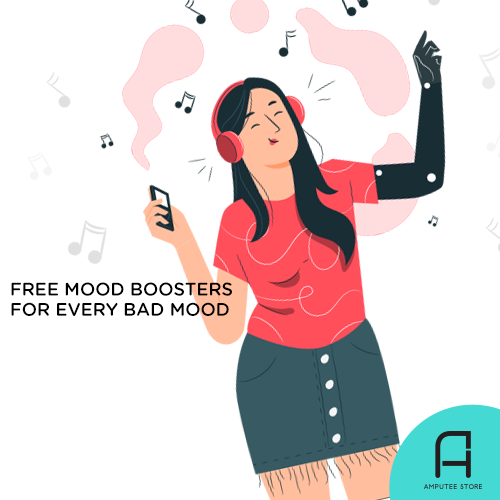Free Mood Boosters for Every Bad Mood
Are you feeling down or having a bad day after receiving some unpleasant news? Sometimes minor disappointments and frustrations can disrupt your daily activities, leaving you feeling grumpy, miserable, and disinterested in the things you need or want to do. If you're not sure how to feel better, don't worry, you're not alone.

Emotional distress can affect you even if it's not extreme, and allowing a bad mood to fester can make it worse. Ignoring the source of your bad mood won't make it go away, but you can set it aside temporarily and focus on something that makes you feel good instead.
We have a few ideas below that can help lift you out of a bad mood for free.
Take a walk outdoors
Going for a short stroll in the nearest park or any green space can do wonders in lifting your low mood. Whether it's the mid-afternoon slump or a long night that's left you feeling gloomy, a brisk 10-minute walk can boost blood flow to your brain and energize you, reducing feelings of sluggishness and fatigue. Walking can also reduce the level of stress hormones in your body while triggering the release of endorphins that can ease discomfort, pain, and stress.
Naturally, sunlight has its benefits too. Spending just 10 or 15 minutes in the sun can stimulate the production of serotonin, as well as more endorphins, providing a good amount of mood-improving chemicals. Moreover, natural light can help you feel more alert and energized, particularly if you've been sitting in a dim room for a while.
And let's not forget about the power of nature. Emerging research indicates that people who spend time outdoors regularly, or even look at images or videos of nature when going outside isn't an option, often have better moods overall.
Listen to music
For a long time, science has praised the benefits of music. Various studies have demonstrated that music has the ability to regulate mood and emotions, alleviate stress and tension, decrease anxiety, enhance healthy brain function, and even improve concentration in some cases.
Therefore, we highly recommend creating a personalized playlist filled with all your favorite tunes, which can be used as a quick pick-me-up whenever you're feeling down.
Call a loved one
Sometimes, after an exhausting day or when you have a stressful event coming up, receiving a message of love and support can make a big difference to lifting your spirits. Even a brief conversation with your significant other, best friend or sibling can help you bounce back from a gloomy mood, anxiety, worry, or other emotional stress.
If calling isn't an option, there are still other ways to stay connected and feel supported. Even a brief exchange over text or chat can work wonders in lifting your mood. You already know that they are there for you, but sometimes you need a funny meme or an inside joke to remind you of it.
Random acts of kindness
Instead of allowing yourself to get lost in the cycle of worry and stress, try directing your energy towards someone else instead. By doing a good deed for someone else, you could brighten their day and bring a smile to their face, which in turn could improve your mood. The simple act of knowing that you have made someone else's day better can leave you feeling more positive and uplifted. Here are a few ideas that you could consider:
-
Show your gratitude towards your healthcare team by giving them a fruit basket on any random day.
-
Take care of a chore for your partner or other family members.
-
Leave a detailed positive review for one of your favorite shops or restaurants.
-
Offer to assist a co-worker if they need any help.
The bottom line
It's perfectly normal to experience bad moods, even over seemingly trivial things. And it's also normal to require a mood boost from time to time. The good news is that most bad moods tend to lift before too long, and there are a lot of things you can do to help yourself feel better.
However, if you're experiencing a low mood that lingers day in and day out, it may be indicative of an underlying issue. If you notice persistent changes in your mood and well-being, and strategies like the ones mentioned above seem to have little effect, it's always a good idea to speak to a therapist.










































































